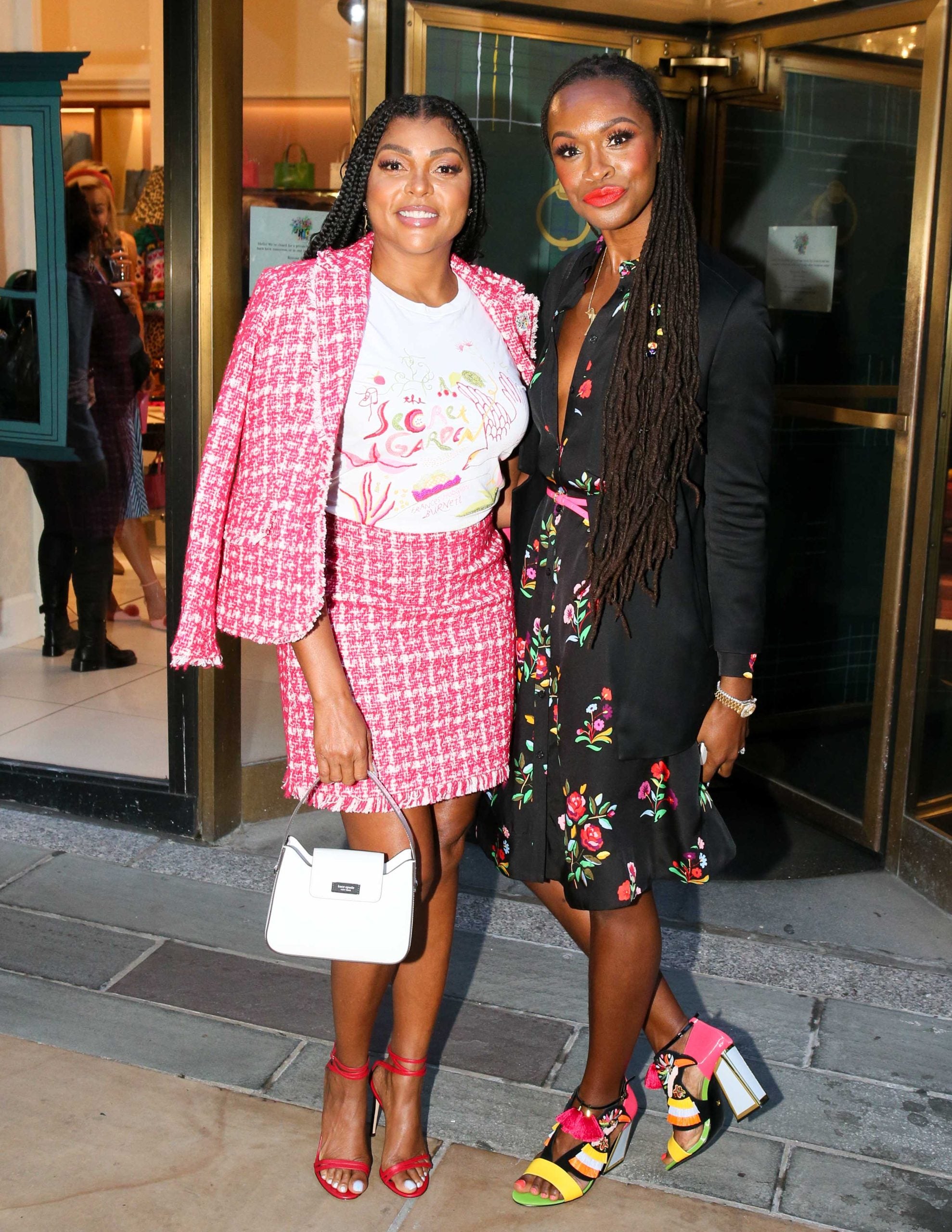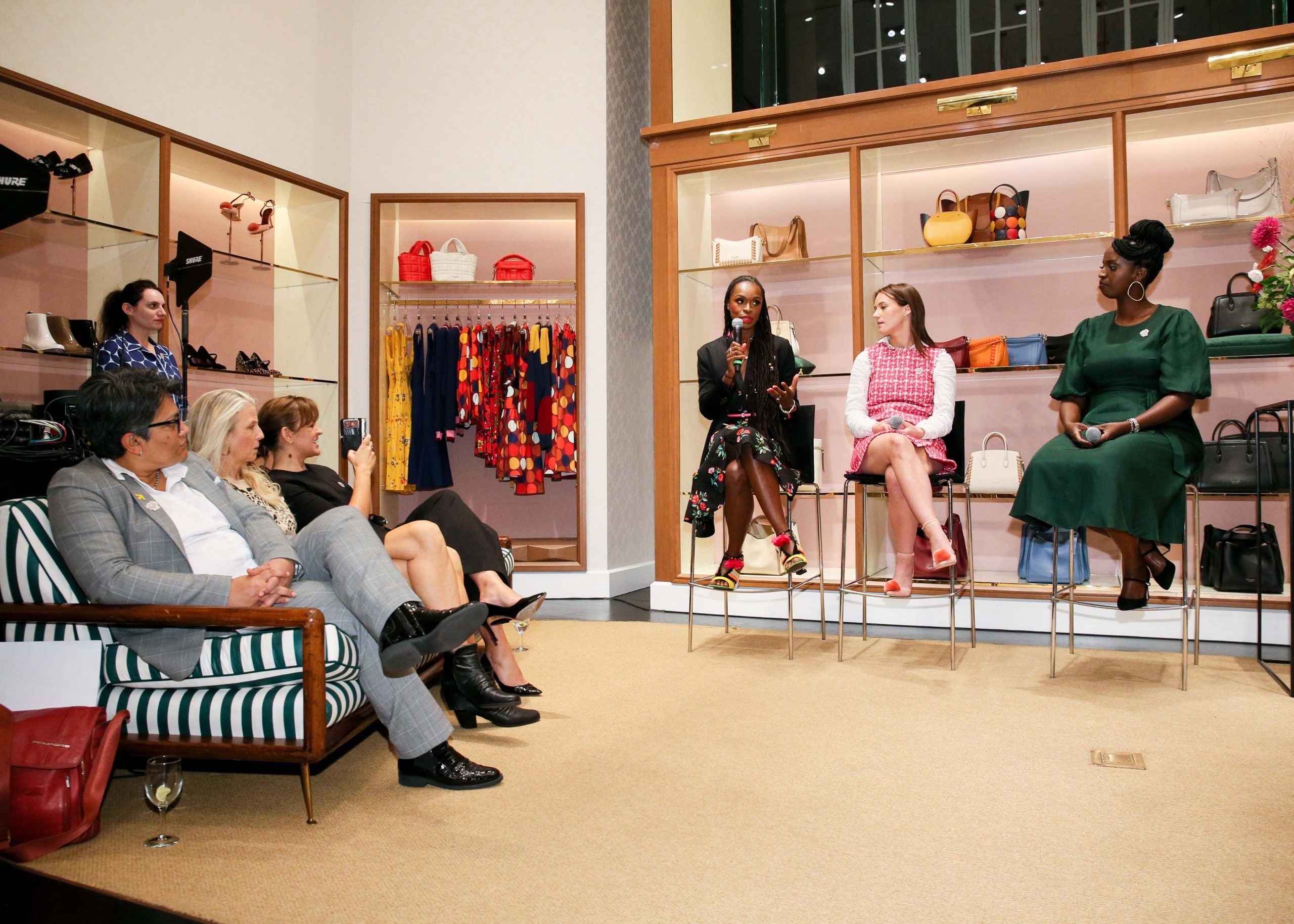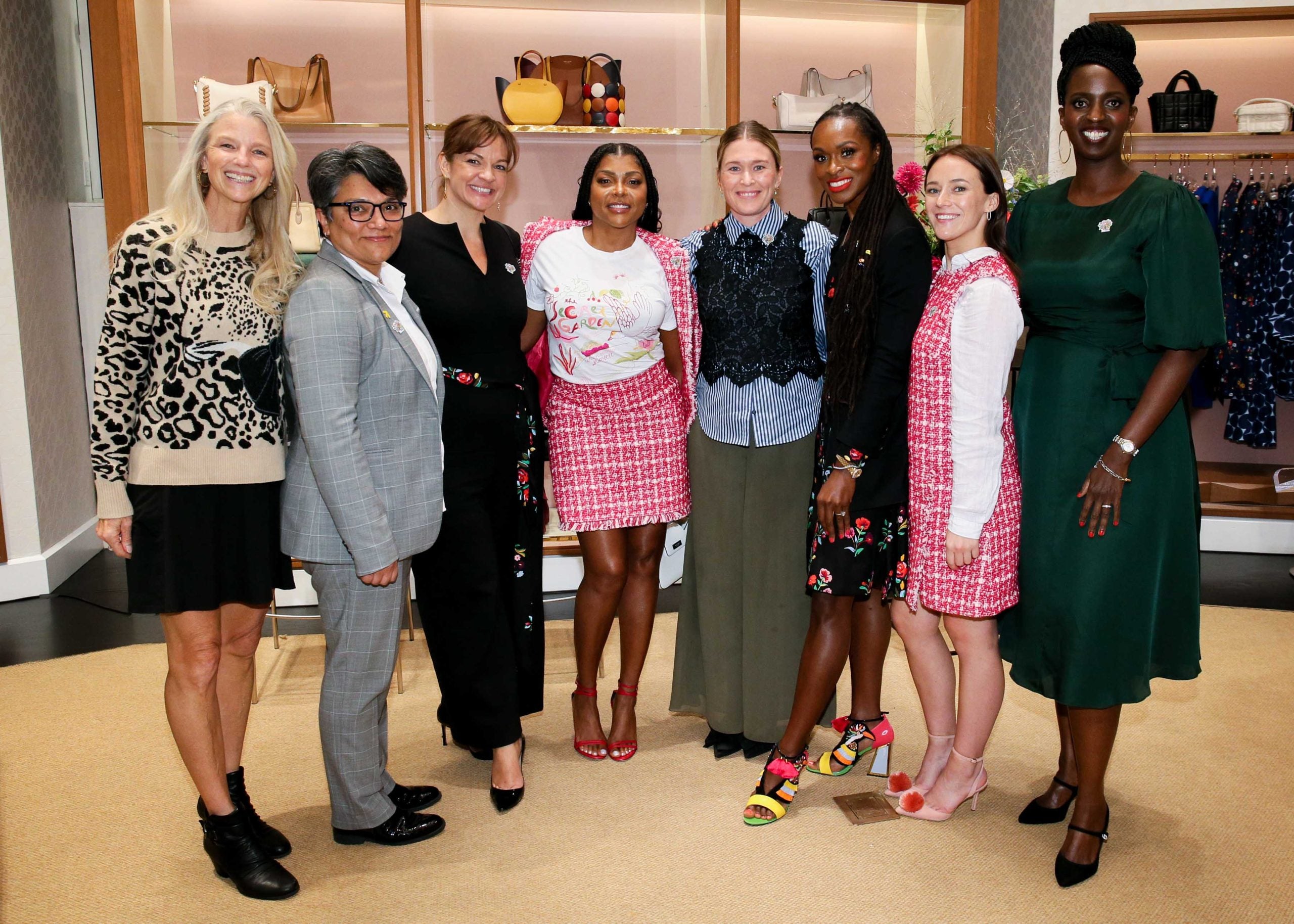
From high functioning anxiety and depression to schizoaffective and bipolar disorder, mental health and wellness impact many, especially women. From the anxiety of workplace burnout and showing up for folks in our personal and professional lives to the fear of failure, COVID-19, and the overturning of Roe V. Wade, women’s mental health has been greatly impacted by the state of the of the world we live in. In an effort to be of support, kate spade new york wanted to champion women through its recent Empowerment Through Mental Health event in New York City.
Featuring the brand’s Social Impact Council — including Taraji P. Henson, Latham Thomas, Elisha London, Catherine Tinsley, Norette Turimuci, and Jazz Thornton — the event took place in ksny’s Rockefeller Center retail location and featured panels discussing the relationship between mental health and sustainable women’s empowerment.
When Social Impact Council member Latham Thomas reflected on kate spade new york’s impact in the mental health space, she acknowledged that the way it handles the conversation with care for and commitment to Black women is admirable.
“We can have these larger conversations about women and girls, but when we think about Black women, it’s different. We’re talking about different metrics, different issues, and we’re talking about different impact,” she said. “We need more dollars. We need more resources [and] commitment in our communities because there’s a barrier for us to even start this journey. When you’re talking about that barrier then you’ve got to look at all the social factors and you’ve got to look at the economic factors and you’ve got to look at then the generational factors,” she said passionately.
She added, “What I feel like [kate spade] has done in their commitment is recognize the vast landscape of organizations, the impact they can make, and be a voice and say [to] other organizations, ‘Hey, we’re taking the lead. Are you coming?’ I think that’s important because they’re in fashion, specifically. They’re one of seven organizations in the world that invests to this extent in mental health.” Thomas continued to praise the fashion brand for its Social Impact Fund and the ability of its grant partnerships to prioritize storytelling and support for sustainable work in the mental health and wellness field.
For Suicide Prevention Awareness Month, ESSENCE exclusively caught up with Thomas and Henson to discuss the relationship between mental health and women’s empowerment, the importance of having conversations about mental wellness with young Black girls, and how essential it is for larger, visible brands and businesses such as kate spade new york to lead the way.
ESSENCE: What does the relationship between women’s empowerment and mental health mean to you, and what does it look like for Black women?
Taraji P. Henson: Well, how are you truly empowered if you don’t have reign over your senses, over your emotions? How you do that is you deal with your traumas. As Black people, we’ve been traumatized for over 400 years, and I’m glad we’re starting to change the narrative, get to the healing, and see what’s on the other side of that pain. That’s how you empower yourself. Life is going to always throw curve balls. It’s not fair, things happen, and the power comes in when you have the tools to maneuver through those challenges and changes.
Why is it important to have these conversations about mental health not just with older Black women, but with Black girls and gender-expansive youth as well?
Latham Thomas: Super important because the reversal is that it’s the young people that have something to teach us. How Gen Z is grounded in their personhood, in what it is that they’re feeling, in what it is that feels equitable, all these things that they use to orient in the world, I think is so powerful. Also, the choice to say, “No, I’m not doing that. I’m not working. I’m not doing an overnighter.” That sense of self and a sense of boundaries that I think is really important to look at and also model [because] the younger generation has an understanding about self-care that the older generation doesn’t have. They have their own wisdom and contributions that they can make and we need to encourage and empower them, inspire them, guide them with skills, pour into them, speak love over them, speak blessing over them, but also learn from them. We need to be living out loud with our stories so that young people can also see what’s possible.

Henson: One thing that these kids have to deal with — and I never had to deal with — is social media. That’s fighting an invisible bully. If we don’t get a hold of this mental health beat now, we’re losing our kids to social media, the bullying, and things that go on on social media. These kids are keeping it to themselves. If we don’t talk about it, how will they heal? If we don’t break the cycles, how will they know to? If they don’t see people that they look up to talking about it and breaking cycles, how will they know to? How will they know there’s a cycle to even break if we don’t discuss it?
It’s up to us, the elders, to show them. No one showed me. I kind of stumbled into it. Now that I know better, I do better. I reach back and I teach. That’s why it was so important for me to start this [Boris Lawrence Henson Foundation] because I feel like with my audience, there’s a certain trust when it comes to me. I’m not trying to sell them everything. There’s a certain trust because I use my own personal situations to share. I mean, the first thing to healing is to talk about it, right? If you keep it to yourself and you have a story to tell, who is that helping?
When did your personal journey with mental health and wellness first begin?
Thomas: I never really separated mental health and physical health so I don’t think of mental health as one area. I really think about well-being through my body so I would think about if I felt anxious, if I felt afraid, or nervous. That would come up my body and I’d be like, “Oh, what is that?” My inquiry would really be about addressing what was happening through me so I’ve never had anxiety that I know of, but there was a series of events that took place where I was very anxious. I couldn’t sleep, I felt my heart racing, I felt my mind racing, I felt exhausted, I felt like I was jet-lagged because I wasn’t able to rest as a result.
One of the nursing staff said, “Listen, it just seems like you were anxious and it could have been a panic attack.” I was like, “What’s that? I’ve never had that.” Interestingly, that was the very first time that I had an event where I felt like I didn’t know what was happening and I felt out of control of my body. I never told anybody this publicly. This is not answering the question about when did my mental health journey start, but that was the first time that I felt like I was overcome by an experience that I didn’t have the tools to make my way through because I didn’t know what was happening.

Henson: Oh God, I guess I would have to say in my late thirties. I started experiencing heightened anxiety after my father passed, and just things in the industry, my son, and me being traumatized by the murder of his father. It’s cute when they’re kids because you can protect them, and then they grow up and they start asking questions. Then through him asking questions for me trying to answer, I realized that I was traumatized as well. I was like, “Oh, well, it’s time to get help.” Thank God I was in a position where I could afford it.
I’m such an empath. I realized that the Black community won’t talk about [mental health], but here I am a Black woman who can gain access. I can afford it, but what about all the Black people in the communities? The underserved communities that don’t talk about it, that might not even know they have mental health issues and won’t even seek the help? How do I help? How do I sit on a hog on a high hill? Life is great for me, but then I can watch people that look like me suffer. I can’t do it. That’s how I started The Boris Lawrence Henson Foundation. That was my journey into this whole mental health, educating myself, and learning with my community.
Why is it important for brands such as kate spade new york to create a bridge between the Black community and mental health and wellness resources?
Henson: Because it takes a community. You can’t do it alone. My foundation is not going to save the entire Black community alone. We need partners. People need people. God was very clever. When God put us on earth, [He] made us look different. We all have different hair, different shapes and sizes, and you know what? We have to figure out how to get along with the other humans and help each other because we need each other. That’s life’s journey. We didn’t free ourselves. We needed allies and it’s the same in everything in life. You need allies. You can’t get everything you need to accomplish in life by yourself. You need help. You need peers, you need friends.
